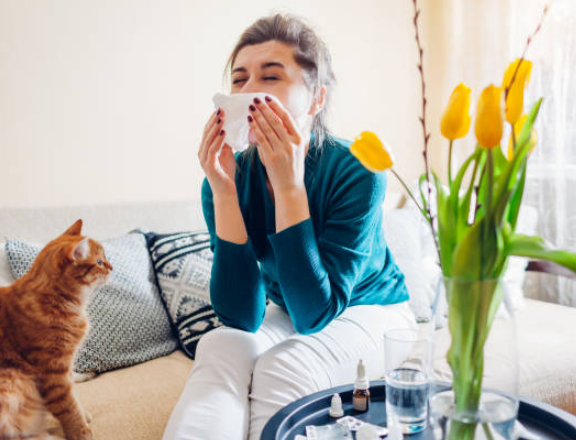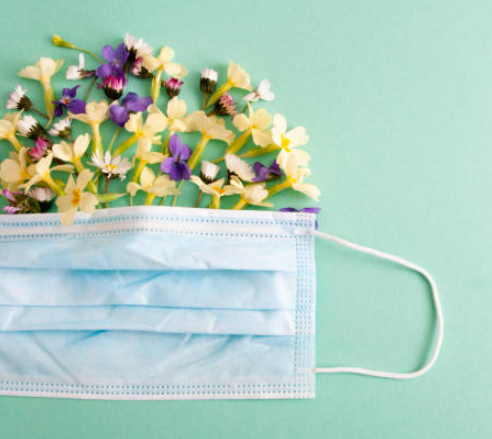The flowers are blooming, you’ve put away your winter coat, and you have more time outdoors during your days. If it weren’t for the damn seasonal allergies, it would be such a blessing. Pollen floats in the air, covering every surface, leaving many people with headaches, runny noses, itchy eyes, and fatigue – all of which completely hinder enjoying the beautiful spring.

The allergist’s office is definitely busy this time of year, but the good news is that there are ways to minimize symptoms. In fact, allergists tell their patients that they want everyone with allergies to follow this advice.
What Causes Spring Allergies and How to Know if You Have Allergies
Sara Parker (RRT, RRT-ACCS, RRT-NPS, AE-C), a member of the American Respiratory Care Association and a clinical associate professor at the University of Missouri, explains that spring allergies are most commonly caused by pollen. “When plants, grasses and trees bloom, they release yellow, powdery substances that people are allergic to,” she said. Dr. Jeanne Lomas, allergy specialist and director of allergy and immunology at WellNow Allergy, added that tree pollen is the number one cause of spring allergies, followed by grass pollen. She added that tree pollen can travel for miles. Therefore, even if you don’t have any trees in your yard, you may still be affected by spring allergies.
Allergy symptoms overlap with symptoms of other common health problems, such as the common cold or flu, making it difficult to determine if your illness is actually caused by a spring allergy. Dr. Lomas says spring allergies and colds can cause sneezing, runny nose, stuffy nose and coughing. But she added that there are symptoms that distinguish the two. “A fever or body aches indicates having the flu or other viral illness, not allergies. Conversely, if you have significant itching, especially in the eyes, nose and ears, it could be caused by allergies,” she said.
Dr. Lomas also says you’re more likely to have this if your family has seasonal allergies. If your symptoms gradually appear like clockwork each spring, that’s another good sign that the condition you’re experiencing is due to a seasonal allergy rather than a cold. However, Dr. Lomas also said spring allergies can occur over time. “This is especially common when the environment changes — for example, if someone moves to a different part of the country to go to school or work,” she said.
Now you know what causes allergies and how to know if they are the cause of your symptoms. Then comes the big question: how to deal with the symptoms?

The Best Advice for Seasonal Allergies
If you know that every spring you will suffer from allergies, Dr. Sherwin Hariri (M.D., FAAAI, FACAAI), allergist at Beverly Hills, recommends proactively starting preventive medications (designed to prevent diseases caused by environmental factors, genetic predisposition, and lifestyle habits) a few weeks before the start of the season. He added that nasal sprays (such as Zicam’s Flonase) and antihistamines can also be taken before the allergy season begins to prevent symptoms. Dr. Hariri says that if your allergy symptoms are severe, it’s worth seeing an allergist for allergy shots or drops, which are a form of desensitization or immunotherapy. “Allergy injections and allergy drops work very well and minimize spring allergy symptoms. They can sometimes relieve a patient’s allergies,” he said.
Dr. Hariri says there are also daily habits that can help reduce exposure to pollen and thus help reduce symptoms. “[People with spring allergies] should close the windows and change their clothes as soon as they enter the house,” he said.
It helps to plan ahead positively, but spring has already arrived. What to do? Dr. Lomas recommends one piece of advice to anyone who has experienced a spring allergy: see an allergist for testing to find out exactly what is causing your symptoms. “With allergy testing, which is usually done through a skin test, you’ll be able to determine if you have allergies and predict which triggers and exposures might be giving you symptoms,” she said.
Dr. Lomas added that a visit to an allergist could also provide other treatment options, such as immunotherapy (aka the allergy injections Dr. Hariri mentioned), which she says are the most effective way to reduce symptoms of environmental allergies. She said it would also reduce dependence on medications.
Indeed, it is not necessary to suffer from allergies in spring; There are effective treatments. Therefore, if you are reading this article while blowing your nose and having a headache, it is worth seeing an allergist for testing. This way, you can really get outside and enjoy spring.
